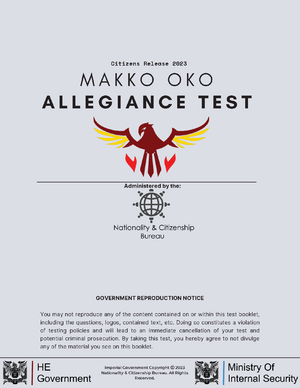Makko Oko Allegiance Test
This article is incomplete because it is pending further input from participants, or it is a work-in-progress by one author. Please comment on this article's talk page to share your input, comments and questions. Note: To contribute to this article, you may need to seek help from the author(s) of this page. |
 Cover of the 2023 Version of the Citizens Release | |
| Acronym | AT domestically MOAT internationally |
|---|---|
| Type | Standardized Test |
| Developer / administrator | Nationality & Citizenship Bureau |
| Knowledge / skills tested | National history, government, laws & regulations |
| Purpose | To assure and confirm an allegiance to and common knowledge of the nation |
| Year started | 2022 |
| Duration | 1 hour and 30 minutes |
| Score / grade range | 0-100 |
| Score / grade validity | Life or until a peace officer orders a retake |
| Offered | Year-round |
| Restrictions on attempts | May retake the test up to the point that they lose citizenship |
| Annual number of test takers | 2,400,000 (2022) |
| Prerequisites / eligibility criteria | Must be 18+ or must have an order from a peace officer to sit for the test |
| Fee | SLO$30 |
| Scores / grades used by | Government of Makko Oko |
| Website | citizenship.gov.mk/allegiance-test |
The Makko Oko Allegiance Test, otherwise referred to as the AT domestically or the MOAT internationally, is a government-mandated standardized test that quizzes test-takers on all matters government and the nation. Topics include culture, laws & regulations, government structure, etc. As of the 2023 exam, the amount of questions was set to 50, with them being split up by topic category. The first AT exam was released on August 12th, 2022, approximately 3 months after the enactment of the statute that established it, the Naturalization Allegiance Act. It was colloquially referred to as the "2022 Release".
The AT exam is both developed and administered by the government's naturalization agency, the Nationality & Citizenship Bureau. All citizens of the Empire are mandated to take the exam upon reaching the age of 18, or upon an order from a peace officer. Non-citizens must sit for and get a passing score on both the AT and the Citizenship Exam in order to become citizens.
